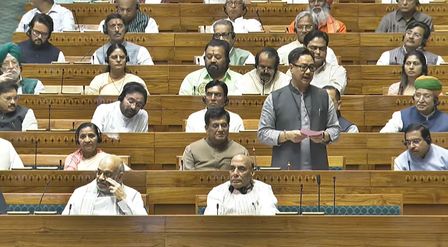Bill not linked to religion, it’s prospective and not retrospective: Kiren Rijiju flays naysayers
New Delhi, Apr 02, 2025, IANS
 New Delhi, April 2 (IANS) Union Minister for Minority Affairs Kiren Rijiju on Wednesday tore into the Opposition for ‘spreading falsehood’ over the Waqf Amendment Bill and urged the ‘doubters and naysayers’ to refrain from misleading the people on the proposed reforms. The Minister, after introducing the bill in Lok Sabha, gave a detailed account of how the Bill was not linked to religion and was only meant to bring transparency and better governance of Waqf properties. He also rubbished charges of any government interference in Waqf properties, including mosques, dargahs and said that their management will lie in their hands only. “Waqf boards will work under state governments. This will benefit marginalised as well as Pasmanda Muslims, including women and children,” he said. “This bill is prospective and retrospective. This is not meant to snatch anyone’s property,” the minister said, dismissing canards spread by naysayers. Launching a sharp critique of the Opposition, the Minister said that these are the same people who peddled lies over previous legislations. “Earlier also, they claimed that the Citizenship Amendment Bill will take away the citizenship rights of Muslims. I want to ask, has anything of this sort happened?” he said. The Minister also shed light on the changes proposed in the bill by the Joint Parliament Committee (JPC). “Under the Waqf Bill, the District Collector was given the last authority to decide on the ownership of land. The JPC suggested certain changes, which have been duly accepted,” he informed the House. “We had proposed two members in the Waqf Tribunal, but the Committee proposed three members with fixed tenure,” he added. He further said that Section 40 of the Waqf Bill was the most draconian law which has now been done away with. “It gave the power to Waqf Boards to declare any property as its own. Now, it will no longer be the case,” he pointed out. The new amendments in the Bill also facilitate appeal in higher courts if the concerned party is not satisfied with the Waqf Tribunal decision. Earlier, the decision of Waqf Boards and Tribunals remained unchallenged.
New Delhi, April 2 (IANS) Union Minister for Minority Affairs Kiren Rijiju on Wednesday tore into the Opposition for ‘spreading falsehood’ over the Waqf Amendment Bill and urged the ‘doubters and naysayers’ to refrain from misleading the people on the proposed reforms. The Minister, after introducing the bill in Lok Sabha, gave a detailed account of how the Bill was not linked to religion and was only meant to bring transparency and better governance of Waqf properties. He also rubbished charges of any government interference in Waqf properties, including mosques, dargahs and said that their management will lie in their hands only. “Waqf boards will work under state governments. This will benefit marginalised as well as Pasmanda Muslims, including women and children,” he said. “This bill is prospective and retrospective. This is not meant to snatch anyone’s property,” the minister said, dismissing canards spread by naysayers. Launching a sharp critique of the Opposition, the Minister said that these are the same people who peddled lies over previous legislations. “Earlier also, they claimed that the Citizenship Amendment Bill will take away the citizenship rights of Muslims. I want to ask, has anything of this sort happened?” he said. The Minister also shed light on the changes proposed in the bill by the Joint Parliament Committee (JPC). “Under the Waqf Bill, the District Collector was given the last authority to decide on the ownership of land. The JPC suggested certain changes, which have been duly accepted,” he informed the House. “We had proposed two members in the Waqf Tribunal, but the Committee proposed three members with fixed tenure,” he added. He further said that Section 40 of the Waqf Bill was the most draconian law which has now been done away with. “It gave the power to Waqf Boards to declare any property as its own. Now, it will no longer be the case,” he pointed out. The new amendments in the Bill also facilitate appeal in higher courts if the concerned party is not satisfied with the Waqf Tribunal decision. Earlier, the decision of Waqf Boards and Tribunals remained unchallenged.